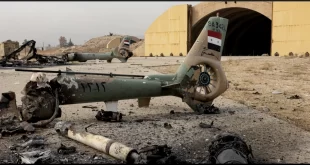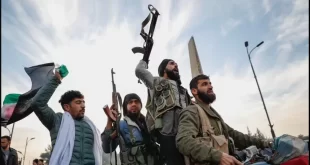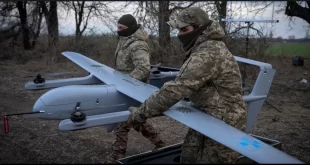from the NewsDesk at The Cradle, January 3, 2023
Abu Mohammed al-Julani, the chief of the Idlib-based extremist group in northern Syria, Hayat Tahrir al-Sham (HTS) – formerly known as the Al-Qaeda affiliated Nusra Front – made a video statement on 2 January rejecting the prospect of Russian-mediated talks between Damascus and Ankara.
The group “is facing a brand-new challenge … and the talks between the Syrian regime and its Russian ally with the Turkish side represent a serious deviation from our goals,” Julani said.
The HTS chief also called on all armed groups in northern Syria to form a ‘united front’ with his group in order to “confront the existing threat,” referring to the potential reconciliation between its supposed ally and its sworn foe.
Jabhat al-Nusra, predecessor of HTS and formerly Al-Qaeda’s official branch in Syria, was initially founded in 2012 with financial support from both Qatar and Turkiye. As Turkiye seriously reconsiders its relationship with the Syrian government, it is likely that the group feels as though it is losing its lifeline.
Julani warned his followers against feeling disappointed by the betrayal of its allies, namely Ankara.
“We have prepared ourselves for these great days to come,” he said, while calling on his fellow militants to stand beside him and resist the upcoming challenge.
On 28 December, a high-level meeting was held in Moscow between the defense ministers of Turkiye, Russia, and Syria, aimed at ensuring “stability in Syria and the region.” This meeting, which was the first ministerial meeting between Damascus and Ankara since 2011, focused on the establishment of a joint mechanism by which the two countries could mutually combat ‘terrorism.’
It also comes as a first step towards a potential rekindling of ties between Syria and Turkiye, which has spent the last 13 years prolonging the Syrian conflict through support for armed groups and violation of Syrian sovereignty. Naturally, it makes sense that such a drastic shift in policy will pose a great deal of anxiety for groups such as HTS, or the Turkish-backed Syrian National Army (SNA).
Regardless of this, the Syrian-Turkish rapprochement has barely taken its first steps, and negotiations are unlikely to officially launch until a complete withdrawal of Turkish forces from Syria is guaranteed.
The comments made recently by Turkiye’s Foreign Minister Mevlut Cavusoglu following the Moscow meeting do suggest a possible Turkish willingness to make concessions, but do not guarantee that a withdrawal is set in stone. Moreover, Washington is making the process more difficult by obstructing a potential agreement to allow the Syrian Arab Army (SAA) to replace Kurdish militants on the border with Turkiye.
This will further delay any actual development that may allow Damascus to reclaim territory occupied by Turkiye.
 Syria Support Movement solidarity with the Syrian people
Syria Support Movement solidarity with the Syrian people





